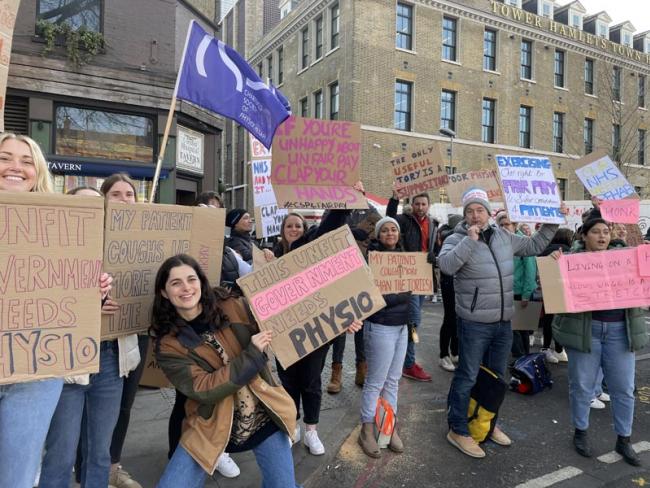
Striking physiotherapists outside the Royal London hospital, Whitechapel Road, London on 9 February 2023. Photo Workers.
Exactly how we fight to defend the NHS as health workers has never been more important at any point in NHS history. It involves a good understanding that our enemy, in the shape of the current government, is probably resigned to losing the next general election and is relaxed about leaving the NHS in a mess.
The government hopes that its scorched earth policy will make the wider working class lose confidence in the service. It wants us as a working class to give up on the NHS and accept privatisation as the solution without the government having to make all the running.
‘Each trade union must give careful thought as to how to conduct the struggle.’
Faced with an enemy with this position, all NHS trade unions need to plan and struggle will need to be persistent and protracted. Each trade union must give careful thought as to how to conduct the struggle in the short, medium and long term.
In September 2022 the government imposed a real-terms pay cut on all 13 trade unions in the NHS Staff Council without negotiation or even discussion. They thought that ambulance staff, nursing staff and other health professionals, exhausted by the pandemic would roll over. They didn’t and they skilfully won votes to take action.
Ambulance workers in Unison, striking from December, led the way with coordinated action involving them, Unite and the GMB. The government would have dearly loved a death during the ambulance workers’ strikes that they could blame on the unions. They could not, because of the organisation and discipline of workers, who asserted class control.
They were joined by nurses in the Royal College of Nursing in January, most taking strike action for the first time, then physiotherapists in February.
Improved
And so it was that on 15 March the unions received an improved offer which they recommended to members. Crucially it was a fully funded offer and not the raiding of another health budget.
All those unions know that they will need to continue the fight. In preparation for future struggle a historic decision was taken at the Unison Health Care Service Group Conference in Bournemouth on 18 April when members unanimously backed a motion to call time on the NHS Pay Review Body (PRB) system. They will now seek direct negotiations on pay.
In May the Royal College of Nursing at their Congress in Brighton also decided to withdraw from the pay review body. Multiple previous attempts to move towards direct negotiations were rejected by Unison, and many RCN members also thought it unthinkable. Taking action changes thinking.
The situation now facing the British Medical Association is challenging. Its industrial action continues. Inevitably, prolonged strike action will harm patients. The doctors acknowledge that both action and inaction have ethical costs, and they must continue to distinguish themselves from a government that doesn’t care about that damage.
Won by workers
Nearly fifty years ago the CPBML published a pamphlet called For Health – a revolutionary struggle. In it we said:
“The National Health Service represents the pinnacle of what social democracy can achieve – the ultimate reform within capitalist relations of production. Never let us forget that our health service was not ‘given’ to us by a benevolent ruling class but was won by the organised working class and by the health workers in particular.”
When the historic pamphlet was written trade unionists from other occupations had the power, now illegal, to take industrial action in support of health workers and in defence of the NHS they had created.
The pamphlet goes on to say that anything we gain under capitalism is never safe. On 5 July 2023 the NHS will be 75 years old, and that sentiment is very pertinent.
The commitment of the working class to the NHS it created has stayed strong over its 75-year history. Despite the restrictions on joint action, the BMA must harness that power of constructive collaboration with the wider class to demand a return to the negotiating table.
